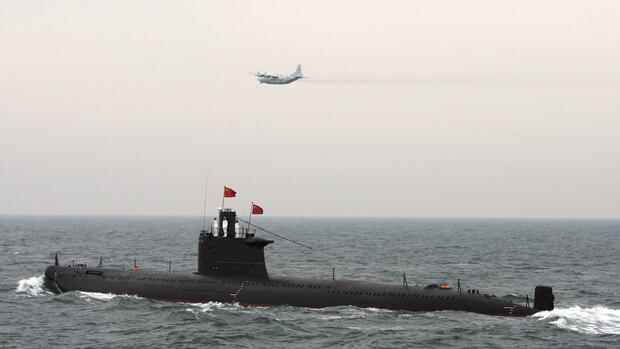Bangkok The deal with Thailand should actually be a new highlight for China’s defense industry: For the first time since the Second World War, the Thai Navy wants to use submarines again – and decided on China as a supplier. The delivery, originally scheduled for next year, was planned as the first export to Southeast Asia of China’s latest generation of diesel-powered submarines, the Yuan class.
She refuses to supply German engines to the Chinese manufacturer. However, Thailand’s government does not want to do without the German technology. She is considering exiting the $400 million deal altogether. That would be a major setback for China’s attempt to shake up the submarine market in Asia.
The situation seems deadlocked. Thai Prime Minister Prayut Chan-ocha asked journalists: “What should we do with a submarine that has no engine? Why should we buy this?”
Top jobs of the day
Find the best jobs now and
be notified by email.
Both sides wanted to get together for crisis talks this month to find out whether the armament project can somehow be saved. However, the negotiations were canceled at the last minute, as was announced a few days ago. The reason for this was China’s persistently strict coronavirus travel restrictions, was the official justification. However, the fact that no solution to the delivery problems is in sight so far should also play a role.
China’s army received German engines for a long time
The deal involves an S26T submarine, an export variant of the Chinese Yuan submarines, which are said to be particularly quiet and therefore difficult to detect. So far, only China’s People’s Army has deployed the submarine type. Thailand should become one of the first users abroad, along with Pakistan, which has ordered eight copies.
According to Thai information, the purchase agreement concluded with China in 2017 provides for the submarine to be operated with three engines from the German manufacturer MTU. But in recent months it has become clear that the Chinese manufacturer China Shipbuilding & Offshore International (CSOC) cannot procure the German technology – work on the armaments project has since stopped.
The fact that Germany would block engine deliveries obviously caught CSOC unprepared. After all, until recently, China’s military had no problems getting hold of German drives.
>> Read more: The Ukraine war drives the arms spiral in Asia
According to the Federal Ministry of Economics and Technology, which is responsible for export control, no export licenses for ship engines with military end use have been issued in China since 2010. Nevertheless, German technology made it into China’s warships.
According to data from the peace research institute Sipri, which records arms deals, the Chinese People’s Army will continue to receive MTU engines, which will be used in naval destroyers, until 2020. According to the institute, these were produced by licensees in China. MTU engines were also installed in the previous generation of Yuan submarines, the so-called Song class.
The engine manufacturer from Friedrichshafen, which belongs to Rolls-Royce Power Systems, said on request that a number of engines had been supplied to partners in China in the past, some of which were manufactured entirely in Germany and some in China.
According to a statement, the applicable requirements were always complied with. “We did not enter into any contracts with the Chinese Ministry of Defense or the armed forces.”
>> Read more: The ports of Shanghai and Hamburg are becoming bottlenecks
However, the company apparently cannot rule out the possibility that the deliveries ended up in the army via detours: the company said the customers and partners did not generally inform them about the whereabouts of the goods.
Not good publicity for China
In the case of deliveries for Chinese submarines, however, there is apparently a clear line: these were approved by the authorities earlier, says Rolls-Royce company spokesman Wolfgang Boller. “These regulations were later adjusted. We have finally stopped supplying submarine engines to China.”
It is unclear exactly when and for what reasons the German reassessment took place. On request, the Federal Ministry of Economics refers to EU sanctions that were issued against China in 1989 as a result of the Tiananmen massacre and that are still in force today.
As a result, “usually no permits are issued for the export of weapons, ammunition and armaments to China”. However, exports of so-called dual-use goods – i.e. products that can be used for both civilian and military purposes – were possible under certain circumstances.
In the case of the Chinese submarine production for Thailand, however, the rejection by the federal government was apparently clear. The German defense attaché in Thailand, Philipp Doert, told the local press: “The export was rejected because it was to be used in the Chinese defense industry.” China had not coordinated with the federal government before using the MTU engines as part of the submarine deal.
The process is not good advertising for China as an arms exporter. He makes potential customers of the People’s Republic aware of the risks involved in doing business that depends on suppliers from the West.
>> Read More: These corona rules now apply to trips to Thailand, Singapore and Co.
China apparently finds it difficult to obtain a replacement in an emergency. The government in Beijing is now offering the Thais two older submarines as an alternative – or the new submarine with a Chinese engine instead of a German one.
Thailand’s military is not enthusiastic about it. The Chinese propulsion has not yet proven itself, the Navy said. We’re still waiting for evidence that it’s as good as MTU’s.
In any case, Bangkok does not want to stick to the contract at any price: In the event that no agreement is reached, there are other options, said Navy Chief of Staff Tharoengsak Sirisawat.
More: Security deal with the Solomon Islands – How China uses small states to expand its military presence
